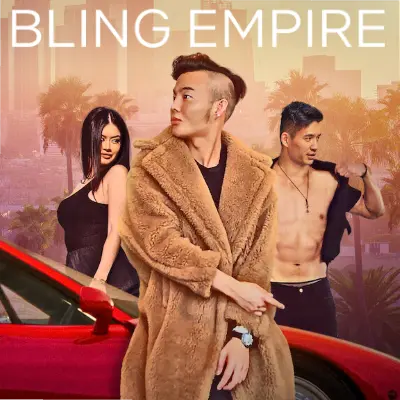Bling Empire ultimately exists for the white gaze
-

"Reality TV has always been an underrated source of representation on screen," says Inkoo Kang. "The often justly maligned genre is, of course, prone to trafficking in stereotypes and mockery as often as it is depicting real-life dilemmas and details. But if you're living in a media world where Asian Americans have been mostly erased, the occasional appearances by people who look like you — programming I call 'representational trash' — tend to have an outsized impact. Eleven years after her first appearance on Survivor, I still remember Brenda Lowe on the reality competition’s 21st season, mostly because I’d never seen an Asian-American woman like her on TV before: tan, athletic, carefree in a bikini. An Indian-American friend of mine can instantly recall, more than a decade later, a My Super Sweet 16 episode in which two Desi sisters rented elephants for their lavish party." Cut to Bling Empire, whose main entry point is model Kevin Kreider, a Korean adoptee from Philadelphia who was raised by white parents. "But Bling Empire ultimately exists for the white gaze," says Kang. "Kreider, the character we’re supposed to anchor ourselves to, is coded as culturally white, with his frequent assertions that he didn’t grow up around any other Asians, despite the fact that his hometown is certainly not lacking in them. (Philly is 7% Asian and home to a booming and well-known Koreatown.) But more importantly, the series tends to conflate its supposedly fun spectacles of opulence with dispiriting spectacles of an exoticized Asianness. When a trio of cast members visit an herb store, for example, the 'weirdness' of the shop's existence is un-tangleable from the thousands of dollars Asians are supposedly willing to pay for its wares. The message of that segment seems to be: Asians are weird for desiring herbs, and doubly weird for desiring them so much they'll cough up eye-popping amounts of money for them. Meanwhile, common religious beliefs, like reincarnation, are treated as cut from the same woo-woo cloth as palm-reading. Distractingly, the characters constantly refer to a monolithic 'Asian culture' despite the cast members representing at least four ethnicities and a couple more countries among them...If Crazy Rich Asians affirmed an Asian-American identity as apart from but just as meaningful as ones from the Old World, Bling Empire uses its characters’ wealth to re-exoticize its Asian and Asian-American characters as bizarre curiosities or, in the case of the long-suffering Christine, martyrs to tradition. It’s a fate the series might have escaped had it been more successful in endowing any dimension to its cast members, who, after eight episodes, never even quite come into their own as archetypes."
TOPICS: Bling Empire, Netflix, Asian Americans and TV, Reality TV
More Bling Empire on Primetimer:- WATCH: Fresh Drama & a Selling Sunset Cameo Shake Up Bling Empire's Season 3 Trailer
- Ten Shows and Movies We Can't Wait to Watch on Netflix in May 2022
- Bling Empire star Kelly Mi Li sues the show's creator, alleging she came up with the idea for the Netflix reality show
- Bling Empire releases its Season 2 trailer
